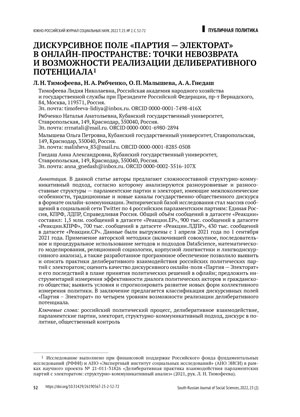Abstract
The authors propose a complex structural and communicative approach, according to which multi-level and heterogeneous structures are analyzed — parliamentary parties and the electorate, which have intergenerational features, traditional and new channels of state-public discourse in the online communication format. The empirical basis of the study was an array of messages on the social network Twitter on 4 Russian parliamentary parties: Edinaja Rossija, KPRF, LDPR, Spravedlivaja Rossija. The total volume of messages in the Reaktsii dataset was: 1.5 million messages in the Reaktsii.ER dataset, 900,000 messages in the Reaktsii.KPRF dataset, 700,000 messages in the Reaktsii.LDPR dataset, 430,000 messages. messages in the Reaktsii.SR dataset. The data was uploaded from April 1, 2021 to September 1, 2021. The application of the author’s methodology (which included the cumulative, consistent and procedural use of the methods and approaches of Data Science, mathematical modeling, relational sociology, corpus linguistics and linguo-discursive analysis), as well as the developed software, made it possible to identify and describe the practices of deliberative interaction of Russian political parties with the electorate; assess the quality of the online discursive field “Party — Electorate” and its consequences in terms of offline political decision-making; offer tools for measuring the effectiveness of the dialogue between political actors and civil society; identify conditions and predict the development of new forms of collective policy measurement. In conclusion, a classification of the discursive fields “Party — Electorate” is proposed according to four levels of the possibility of realizing the deliberative potential.
Keywords
Acknowledgements
The reported study was funded by RFBR and EISR according to the research project № 21-011-31826 “Deliberative practice of interaction of parliamentary parties with the electorate: structural-communicative analysis” (2021).
References
- Akhremenko, A. S., Belenkov, V. Ye., Petrov, A. P. (2021). Logika protestnykh kampaniy: ot empiricheskikh dannykh k dinamicheskim modelyam (i obratno) [The Logic of Protest Campaigns: From Empirical Data to Dynamic Models (and Back)]. Polis. Politicheskiye issledovaniya [Polis. Political Studies], 3, 147–165. DOI https://doi.org/10.17976/jpps/2021.03.10
- Collins, B., Hoang, D. T., Nguyen, N. Th. & Hwang, D. (2021). Trends in Combating Fake News on Social Media. Journal of Information and Telecommunication, 5(2), 247–266. DOI 10.1080/24751839.2020.1847379.
- Dryzek, J. S. (2010). Foundations and Frontiers of Deliberative Governance. Cambridge: Cambridge University Press. DOI 10.1093/acprof:oso/9780199562947.001.0001.
- Freelon, D., Wells, Ch. (2020). Disinformation as Political Communication. Political Communication, 37(2), 145–156. DOI 10.1080/10584609.2020.1723755.
- Komarovskiy, V. S., Savenkov, R. V. (2021). Politicheskaya povestka i obraz budushchego v predvybornykh dokumentakh politicheskikh partiy na vyborakh deputatov Gosudarstvennoy Dumy 2021 g. [Political Agenda and Image of The Future in The Election Documents of Political Parties for The Election of Deputies of The State Duma 2021]. Yuzhno-rossiyskiy zhurnal sotsial’nykh nauk [South- Russian Journal of Social Sciences], 22(2), 21–36. DOI 10.31429/26190567-22-2-21-36
- Koval’chuk, S. K. (2019). Deliberativnyye onlayn-forumy v prostranstve sovremennoy politicheskoy kommunikatsii: problemy i perspektivy [Deliberative Online Forums in the Space of Modern Political Communication: Problems and Prospects] (Candidate Dissertation) Moscow.
- Martynov, M. Yu., Markhinin, V. V. (2020). Elektoral’nyye instrumenty partiynoy gegemonii YER: tendentsii razvitiya i predely prochnosti [Electoral Instruments of a Party Hegemony: Recent Developments and the Limits of the United Russia Party’s Monopoly]. Yuzhno-rossiyskiy zhurnal sotsial’nykh nauk [South-Russian Journal of Social Sciences], 21(1), 86–103. DOI 10.31429/26190567-21-1-86-103
- Pushkareva, G. V., Mikhaylova, O. V., Batovrina, Ye. V. (2021). Politicheskiye oriyentatsii rossiyskogo studenchestva: regional’nyy srez [Political Orientation of Russian Students: Regional Profile]. Yuzhno-rossiyskiy zhurnal sotsial’nykh nauk [South-Russian Journal of Social Sciences], 22(1), 19–33. DOI 10.31429/26190567-22-1-19-33
- McKay, S., Tenove, Ch. (2020). Disinformation as a Threat to Deliberative Democracy. Political Research Quarterly, 74(3), 703–717. DOI 10.1177/1065912920938143.
- Nazarchuk, A. V. (2011). Ponjatie deliberativnoy politiki v sovremennom politicheskom processe [The Concept of Deliberative Politics in the Modern Political Process]. Polis. Politicheskie issledovanija [Polis. Political Studies], 5, 99–103.
- Pushkareva, G. V., Mikhaylova, O. V., Batovrina, Ye. V. (2021). Politicheskiye oriyentatsii rossiyskogo studenchestva: regional’nyy srez [Political Orientation of Russian Students: Regional Profile]. Yuzhno-rossiyskiy zhurnal sotsial’nykh nauk [South-Russian Journal of Social Sciences], 22(1), 19–33. DOI 10.31429/26190567-22-1-19-33
- Ryabchenko, N.A., Malysheva O. P., Gnedash A. A. (2019). Upravlenie politicheskim kontentom v social’nykh setjah v period predvybornoy kampanii v epohu postpravdy. [Presidential Campaign in Post-Truth Era: Innovative Digital Technologies of Political Content Management in Social Networks Politics]. Polis. Politicheskie issledovaniya [Polis. Political Studies], 2, 92–106. DOI 10.17976/jpps/2019.02.07
- Savin, N. Y. (2019). Mezhdu substanciej i proceduroj: dve traditsii v deliberativnoy demokraticheskoy teorii. [Between Substance and Procedure: Two Traditions in Deliberative Democratic Theory]. Polis. Politicheskie issledovaniya [Polis. Political Studies], 4, 26–39. DOI 10.17976/jpps/2019.04.03
- Timofeyeva, L. N. (2021). Konfliktnaya politicheskaya kommunikatsiya v sovremennoy Rossii: vidy, kachestvo, rezul’tat [Conflicting Political Communication in Contemporary Russia]. In O. V. Gaman-Golutvina, L. V. Smorgunov, L. N. Timofeyeva (Eds) Rossiya i politicheskiy poryadok v menyayushchemsya mire: tsennosti, instituty, perspektivy: Materialy Devyatogo Vserossiyskogo kongressa politologov [Russia and the Political Order in a Changing World: Values, Institutions, Prospects: Proceedings of the Ninth All-Russian Congress of Political Scientists] (pp. 501–502). Moskva: Izdatel’stvo “Aspekt Press”.
- Timofeyeva, L. N. (2021). Osobennosti formirovaniya politicheskikh suzhdeniy v onlayn-diskurse vlasti i oppozitsii [Features of the Formation of Political Judgments in the Online Discourse of Power and Opposition]. In L. V. Smorgunov (Ed.) Autsorsing politicheskikh suzhdeniy: problemy kommunikatsiy na tsifrovykh platformakh [Outsourcing of Political Judgments: Problems of Communications on Digital Platforms] (pp. 85–108). Moskva: Politicheskaya entsiklopediya (ROSSPEN).
- Volkova, A. V., Kulakova, T. A. (2018). Sovershenstvovaniye antikorruptsionnoy politiki: vozmozhnosti i predely setevogo politicheskogo upravleniya [Improving Anti-Corruption Policy: Opportunities and Limits of the Network Political Governance]. Yuzhno-rossiyskiy zhurnal sotsial’nykh nauk [South-Russian Journal of Social Sciences], 19(4), 40–56. DOI 10.31429/26190567-19-4-40-56
- Yadova, M. A. (2020). Pokoleniye millenialov v rossiyskom obshchestve: v poiskakh drugoy molodezhi [Generation of Millennials in Russian Society: In Search of Another Youth]. Polis. Politicheskiye issledovaniya [Polis. Political Studies], 6, 181–188.
- Young, I. M. (2001). Activist Challenges to Deliberative Democracy. Political Theory, 29(5), 670–690.
 Русский
Русский


